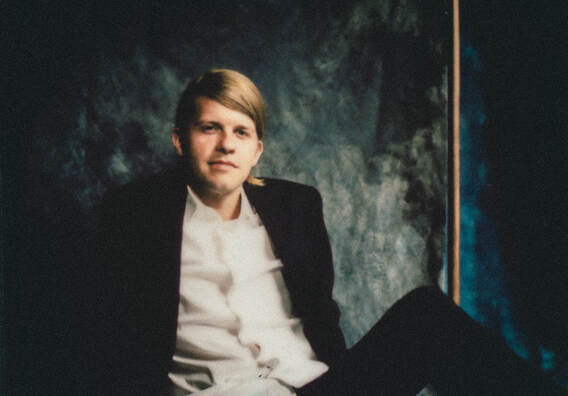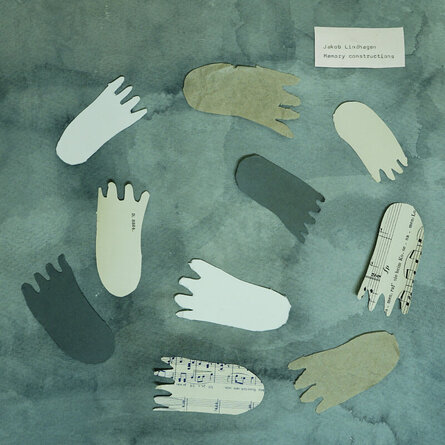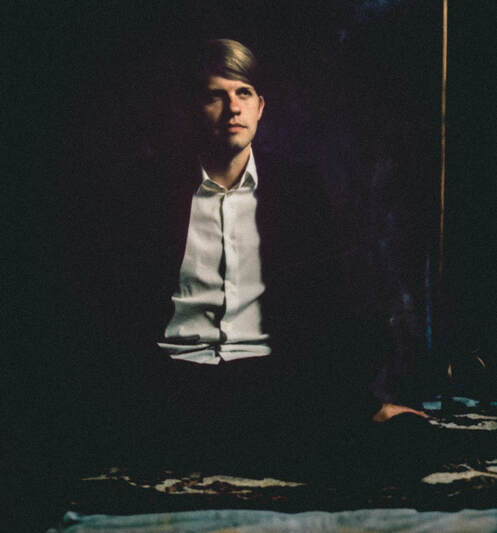Klanglandschaften
With the new album Memory Constructions, Jakob Lindhagen from Sweden has captured the perfect essence of Scandinavian melancholy and created a highlight of the year. In a conversation (in English), the musician talks about the creation, the collaboration with the Selke brothers from CEEYS and other neoclassical topics.

Hello Jakob, how are you currently?
I’m well, thanks. Autumn is really settling here in Sweden with the cold and increasing darkness, and although I in a sense miss summer, Autumn really fits my personalty.
Your new album "Memory Constructions" has just been released, are you excited beforehand or is a release already routine for you?
This one is definitely special. It’s almost on the day five years after my first solo album ”Paces”, so the process of making this album has been long, and honestly not always easy. So there’s a mixture of slight difficulty of letting ot go, to a bit of fear about exposing it and pride of my achievement.
How has the feedback been on the album so far?
I’m very happy to see in reviews, comments and in conversations that people really seem to appreciate the album as a whole, and have taken in and reflected around the concept. This was something that was very important to me while making the album, but knowing that album-listening, and especially conceptual album-listening, is not not how most people consume music today, I’m very positively surprised to see these reactions.
Tell a little bit about your musical past. How did you get into music?
I come from a family where music always have been very present, although no-one has pursued it professionally. At the age of three I got a toy guitar my mum built for me, that was my most precious belonging, and at the age of five I was put in violin class, that I played until I was around 12. In my teens I turned to the piano and guitar, and actually considered that my main instrument for a several years, and when starting to make music I mostly made it on the guitar. When discovering post-rock and instrumental music, that inspired me to ditch singing - writing lyrics always took me significantly longer than all the other aspects of music making (and in all honesty they were also significantly worse than the other elements too so it was all for the better), and I uploaded some stuff on Myspace, because yeah, it was that long ago I was a teenager!
That led to a song being picked up by a film maker, Ahang Bashi, who got to use it in a short film that gained some prices and recognition. That was two important turning points for me - 1) the insight that my music fitted well to other media and that this was something I wanted to explore further, and 2) that when she later made her feature-length debut ”Fragility” (”Skörheten”), I got the opportunity to write the original music to it. As the film got glowing reviews and was nominated for ”Best Film” at the Swedish Academy Awards, that also changed things for me.
You also write music for film and TV – If you could choose a series/film, which one would Jakob Lindhagen write the score for?
Well, I wouldn’t pass on the opportunity to replace Michael Stein and Kyle Dixon to score the final Stranger Things season! Especially not if that would also entail getting their synth-dream studio, haha!
I’m well, thanks. Autumn is really settling here in Sweden with the cold and increasing darkness, and although I in a sense miss summer, Autumn really fits my personalty.
Your new album "Memory Constructions" has just been released, are you excited beforehand or is a release already routine for you?
This one is definitely special. It’s almost on the day five years after my first solo album ”Paces”, so the process of making this album has been long, and honestly not always easy. So there’s a mixture of slight difficulty of letting ot go, to a bit of fear about exposing it and pride of my achievement.
How has the feedback been on the album so far?
I’m very happy to see in reviews, comments and in conversations that people really seem to appreciate the album as a whole, and have taken in and reflected around the concept. This was something that was very important to me while making the album, but knowing that album-listening, and especially conceptual album-listening, is not not how most people consume music today, I’m very positively surprised to see these reactions.
Tell a little bit about your musical past. How did you get into music?
I come from a family where music always have been very present, although no-one has pursued it professionally. At the age of three I got a toy guitar my mum built for me, that was my most precious belonging, and at the age of five I was put in violin class, that I played until I was around 12. In my teens I turned to the piano and guitar, and actually considered that my main instrument for a several years, and when starting to make music I mostly made it on the guitar. When discovering post-rock and instrumental music, that inspired me to ditch singing - writing lyrics always took me significantly longer than all the other aspects of music making (and in all honesty they were also significantly worse than the other elements too so it was all for the better), and I uploaded some stuff on Myspace, because yeah, it was that long ago I was a teenager!
That led to a song being picked up by a film maker, Ahang Bashi, who got to use it in a short film that gained some prices and recognition. That was two important turning points for me - 1) the insight that my music fitted well to other media and that this was something I wanted to explore further, and 2) that when she later made her feature-length debut ”Fragility” (”Skörheten”), I got the opportunity to write the original music to it. As the film got glowing reviews and was nominated for ”Best Film” at the Swedish Academy Awards, that also changed things for me.
You also write music for film and TV – If you could choose a series/film, which one would Jakob Lindhagen write the score for?
Well, I wouldn’t pass on the opportunity to replace Michael Stein and Kyle Dixon to score the final Stranger Things season! Especially not if that would also entail getting their synth-dream studio, haha!
I am especially interested in portraying emotional complexity
 Memory Constructions was released on September 23, 2022.
Memory Constructions was released on September 23, 2022.
The theme of the new album is memories - It's very meditative and full of calm. Can you tell us a bit about the history of its creation?
I’ve always loved concept albums, where everything works together in a wider sense and where the whole is something bigger than the respective parts put together, so I knew that was what I wanted to make. The theme came to me after thinking back of my childhood home, and realizing details about it where becoming fuzzy. I later visited the small town where I grew up, for the first time in about a decade, and spent a couple of hours just walking around by myself. Apart from being there very vividly brought back memories, the changes really got to me. Some buildings for example were definitely new, but I struggled at times to remember what had been there before.
Some details struck me as off - but I couldn’t make out if the place I had changed, or if it had been there before but I just couldn’t remember it. And a block of houses were actually placed somewhere else than where I, very vividly, had placed them in my memory. This experience got me super fascinated with memory research, and the realization that our memories are actually a lot less reliable than we think of them. Of course, in the context of me misplacing some houses wrong in a small Swedish city the consequences are fairly minimal, but when we have a criminal justice system based on testimonies from memory - that’s a whole different thing. Neither do I want to get overly mystical about it - I’m not saying that you shouldn’t trust what you remember at all, but the unreliability behind such a huge part of your identity such as your memories, put the last piece in the puzzle for me.
The protagonist is the piano, what makes the instrument so special in your eyes?
The piano is just so extremely versatile in what sounds and moods you can create, using only that. The mechanism, how it actually produces sound, is also equally brilliant, complex and fascinating, and the fact that there’s so much originality to each piano, and each note played, as there are so many factors influencing - the room, the player, how recently it was tuned etc.
Is there a track from the 8 on the album that means something very special to you?
All of the tracks mean a lot to me in their own way. But if I had to pick one, I think it has to be ”Resurfaced”. As someone who tends to be very minimalist and work with subtle changes and details, it was refreshing just adding more instruments, layers and things than I can remember is on there, work with sudden switches, push the intensity and make something that feels both like something I’ve never done before, yet still sounding very much like me.
How was the collaboration with the two Selke brothers from CEEYS?
I first got to know them in 2018, when they invited me and Sofia (Vargkvint, my artistic collaborator) to come and play at the second edition of Q3Ambient, a three-day festival for neoclassical, ambient and experimental music they organize in Potsdam. We extended that to a small tour in Germany with more shows in and around the Berlin area, where we both did shows as our separate projects, but also collaborated and played together. Me and Sofia had already played and performed together for a long time, so we knew each other musically really well, but adding the two of them instantly just felt intuitively right. So I knew from that experience that I wanted to approach my next album as if it was to be performed by us as a quartet.
Were you able to learn something new from them both?
Their hard work, determination, positivity and seeing and finding opportunities has actually made me and Sofia start to use the expression ”What would Daniel and Sebastian do?” whenever we encounter difficulties!
What I felt about your music and your art was a familiar melancholy. How important is it to you that these emotions touch you?
Thank you, I take that as a huge compliment! To me it’s very important that music convey emotions, and am especially interested in portraying emotional complexity - when the emotions have several layers, and potentially different meaning to different people.
Do you already have ideas for a follow-up project?
I do - first off, I have invited some really inspiring people to rework ”Memory Constructions”. I have also spent the last days recording for a project I’m evolved in that’s super exciting, as well as balancing two separate follow-up solo projects at the moment. One where I’m finalizing recording and am at the stage where I’m doubting wether to release this at all, and one I’ve just started and am still excitedly exploring. So we’ll see what happens and how long it takes - hopefully less than five years until the next solo record!
If you want to compose - compose

What does Jakob Lindhagen do when he's not at the piano or in the studio?
Take walks. Seeing friends and family. Watch movies, read and drink coffee - I guess fairly normal stuff. And also do music just for fun. During the pandemic I also got really into doing crosswords for a while, haven’t really done it for quite some time now but should maybe pick it up again, if I can also get over the fact that I feel that I’m too young to be enjoying such an old-person habit as much, haha!
Do you follow the releases of others music? Which album or composer made a big impression on you recently?
I try my best, but at times it’s hard to keep up with the sheer volume of music getting released constantly! And as I’m also someone who really values taking the time to sit down and actively listen to music and not just have it in the background, you tend to fall behind - especially in periods when I have a lot of work to do and really feel that I’d prefer silence instead of music when having time off. With that said, I love Madeleine Cocolas new album ”Spectral”, definitely one of my favorite releases this year!
What advice would you give to young people who are talented and love to compose music but don't dare release their music because they think it's bad or nobody cares?
If you want to compose - compose. If the thought of releasing the music makes you feel uncomfortable or scared, then you don’t have to release it. It’s perfectly fine to just do something for the love of doing it. If you do want to release it however - good for you! It’s easier said than done, but I think to try and find a balance between a healthy dose of following dreams, to push you to do things, and being mentally prepared that the music industry is very tough. Having/finding friends or a community of people doing similar things and being in a similar position, is definitely something I would recommend though. It has helped me a lot.
How do you see the music landscape of neoclassical in general? Please tell us what bothers you and what you see as exemplary in return.
Good question! I’d say that it’s ever changing, and quite complex. The domination of streaming services and mood-playlists has on one hand made it possible for more composers to reach out with their music, and with the popularity of playlists like Peaceful Piano etc made it possible for lesser-known composers to gain a lot of streams and actually make a living out of it, if landing placements. The exposure and streams this leads to can be quite misleading though, as the vast majority of the listeners don’t actively listen to these playlists - they put it on in the background while doing something else (maybe even sleeping!), and very, very few would go to these playlists to actively search out new artists, or pay attention to/care between the difference of one artist or the other. So these tech-companies has created a formula for what the music should sound like, and maybe I’m naive and idealistic about it, but I would rather see that being created by the artists themselves, and that maybe composers feel that they have to compromise more out-of-the-box ideas for playlist-friendliness. The whole ”balancing artistic values/ being unique with commercial interests/what you know works” is a tale as old as time for artists though, it has just taken a new shape.
Something I find very exemplary and heart-warming about the genre though, is the sense of community. I’ve been fortunate to meet many fellow artists in the scene, and so many are so extremely kind-hearted and generous. It warms my heart seeing how helpful and supportive people are of each other, and although the pandemic of course took its turn on live initiatives, some of them are still going, some are starting up again and some new are getting established.
What exactly can the press, editors or journalists do to make classical music or your music more popular?
That is also a very good question. I’m really happy to see writers like yourself really taking the time and effort to write good quality articles, reviews and interviews, and covering niche genres such as this one. So if the question would be directed towards yourself - as in what André at Gezeitenstrom could do differently - then I would just say keep doing what you do, and we are many who appreciate that you do it so much! If you’re talking about journalism in general to shine more light on neoclassical music to popularize it - then it’s trickier. There’s still a bit of a gap between the neoclassical world and the ”traditional classical”, although I think it’s constantly shrinking.
Thank you very much Jakob, the last words are yours:
Thank you very much for talking to me André, and I’m so grateful for the love and support you’ve shown my album!
The interview was conducted by André Schönauer
Artist photos by Fabian Rosenberg
Links to Jakob Lindhagen:
|
Memory Constructions on Bandcamp:
|
